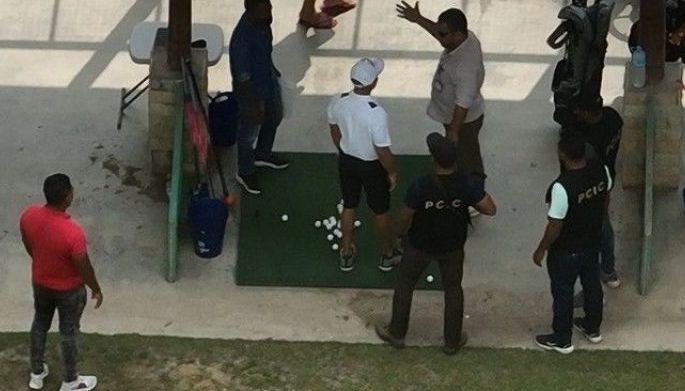MANILA, Philippines — The Department of Justice (DOJ) on Friday said that the government is looking at “different options” for the return of Interpol red-listed Arnolfo Teves Jr. to the Philippines.
The expelled lawmaker, who was included in the Interpol red list in February, was arrested by local law enforcement in Timor-Leste on Thursday while playing golf in a driving range in Dili.
Related Stories
President Ferdinand Marcos Jr., in a separate statement, lauded the successful arrest of Teves.
“Rest assured that the government will take all necessary actions to bring him back to the country so he can face the charges filed against him,” Marcos said in a post on X (formerly Twitter).
I commend the collaborative efforts of our law enforcement agencies and our international partners in the successful arrest of former congressman Arnolfo "Arnie" Teves Jr. in Timor-Leste.
Rest assured that the government will take all necessary actions to bring him back to the…— Bongbong Marcos (@bongbongmarcos) March 22, 2024
In an interview with the press on Friday, DOJ spokesperson Assistant Secretary Mico Clavano said that the agency is looking at deporting or extraditing Teves so that he could finally return to the country.
According to Clavano, deportation can be a quicker process as Teves’ passport has been canceled through a court order.
However, the timing of the deportation will depend on the East Timor government, according to the DOJ spokesman.
“Kagaya dito sa Pilipinas, kung idedeport natin ang isang dayuhan, or isang foreigner na undesirable alien tayo rin naman ang nagsasabi kung kelan natin idedeport, the same way there,” Clavano said.
(Just like here in the Philippines, when we deport a foreigner, or an undesirable alien, we get to say when to deport them, the same way there.)
“So if we choose that route, deportation, the timing will up to them,” he added.
On the other hand, if the Philippine government asked Timor-Leste for the extradition of the expelled solon, it would take a longer time as the Philippines does not have an extradition treaty with Timor-Leste.
Timor-Leste would still be obliged to comply with the extradition request.
"Kung sa extradition po kasi magiging international obligation ‘yon which means that it will take some time dahil may mga documents pa ‘yon na kailangan ipadala sa Timor-Leste, such as the warrant of arrest and the investigation sheet [galing] dito sa Pilipinas,” Clavano said.
(In the case of extradition, it would become an international obligation which means that it will take some time because there are documents that need to be sent to Timor-Leste, such as the warrant of arrest and the investigation sheet here in the Philippines.)
Extradition process
Extradition is a formal process in which one country hands over an individual to another jurisdiction where they are accused or convicted of a crime.
The extradition laws in the Philippines are governed by Presidential Decree No. 1069, also known as the "Philippine Extradition Law".
During the extradition process, a country with an extradition treaty requests the transfer of an individual from their country to face charges in the requesting country.
“Under our extradition treaties with other countries, there must be a formal request coursed through diplomatic channels by the requesting state to trigger the whole extradition process,” Solicitor General Menardo Guevarra explained to Philstar.com in an online message in February.
According to the DOJ, the following countries have an extradition treaty with the Philippines:
- Australia
- Canada
- China
- Hong Kong Special Administrative Region
- India
- Indonesia
- Korea
- Micronesia
- Russia
- Spain
- Switzerland
- Thailand
- United Kingdom
- United States
The requesting country then must make an extradition request to the Department of Foreign Affairs addressed to the Secretary of Foreign Affairs.
The DFA subsequently forwards this request for extradition to the DOJ, to which the justice department will file a petition before the Court of Appeals (CA).
The appellate court will then hear the merits of the extradition request. If the court determines that the petition has merit, it will issue an extradition order.
'Not indicative of guilt'
Meanwhile, in a separate statement, Teves’ lawyer, Ferdinand Topacio, said that the expelled lawmaker’s arrest is not “ indicative of his guilt in any case in the Philippines, nor was it because of violation of any law of Timor-Leste,” but is only a “[mechanism] inherent in the system of the Interpol.”
Topacio also shared that Teves’ legal team in Timor-Leste is led by former East Timor Minister of Justice Tiago Amaral Sarmento and former Timorese Prosecutor-General Jose Ximenes.


